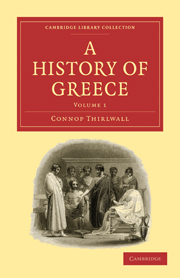Book contents
- Frontmatter
- ADVERTISEMENT
- Contents
- CHAPTER I GEOGRAPHICAL OUTLINES OF GREECE
- CHAP. II THE EARLIEST INHABITANTS OF GREECE
- CHAP. III FOREIGN SETTLERS IN GREECE
- CHAP. IV THE HELLENIC NATION
- CHAP. V THE HEROES AND THEIR AGE
- CHAP. VI THE GOVERNMENT, MANNERS, RELIGION, KNOWLEDGE, AND ARTS OF THE GREEKS IN THE HEROIC AGE
- CHAP. VII THE RETURN OF THE HERACLEIDS
- CHAP. VIII THE LEGISLATION OF LYCURGUS
- CHAP. IX THE MESSENIAN WARS AND AFFAIRS OF SPARTA DOWN TO THE SIXTH CENTURY B. C.
- CHAP. X NATIONAL INSTITUTIONS AND FORMS OF GOVERNMENT
- APPENDIX
CHAP. VI - THE GOVERNMENT, MANNERS, RELIGION, KNOWLEDGE, AND ARTS OF THE GREEKS IN THE HEROIC AGE
Published online by Cambridge University Press: 05 July 2011
- Frontmatter
- ADVERTISEMENT
- Contents
- CHAPTER I GEOGRAPHICAL OUTLINES OF GREECE
- CHAP. II THE EARLIEST INHABITANTS OF GREECE
- CHAP. III FOREIGN SETTLERS IN GREECE
- CHAP. IV THE HELLENIC NATION
- CHAP. V THE HEROES AND THEIR AGE
- CHAP. VI THE GOVERNMENT, MANNERS, RELIGION, KNOWLEDGE, AND ARTS OF THE GREEKS IN THE HEROIC AGE
- CHAP. VII THE RETURN OF THE HERACLEIDS
- CHAP. VIII THE LEGISLATION OF LYCURGUS
- CHAP. IX THE MESSENIAN WARS AND AFFAIRS OF SPARTA DOWN TO THE SIXTH CENTURY B. C.
- CHAP. X NATIONAL INSTITUTIONS AND FORMS OF GOVERNMENT
- APPENDIX
Summary
I.—The political institutions of the heroic period were not contrived by the wisdom of legislators, but grew spontaneously out of natural causes. They appear to have exhibited in every part of Greece a certain resemblance in their general outlines, but the circumstances out of which they arose were probably not everywhere the same, and hence a notion of them, founded on the supposition of their complete uniformity, would probably be narrow and erroneous. The few scanty hints afforded to us on the transition from the obscure period which we may call the Pelasgian, to that with which Homer has made us comparatively familiar, do not enable us to draw any general conclusion as to the mode in which it was effected. We can just discern a warlike and adventurous race starting up, and gradually overspreading the land; but in what relation they stood to the former inhabitants, what changes they introduced in the ancient order of things, can only be conjectured from the social institutions which we find subsisting in the later period. These do not generally present traces of violent revolutions, and subjugating conquests, like those of which the subsequent history of Greece furnishes so many examples; yet it is natural to imagine that they took place occasionally, and here and there we meet with facts, or allusions, which confirm this suspicion. The distinction between slaves and freemen seems to have obtained generally, though not perhaps universally: but there is no distinct trace that it anywhere owed its origin to an invasion which deprived the natives of their liberty.
- Type
- Chapter
- Information
- A History of Greece , pp. 161 - 248Publisher: Cambridge University PressPrint publication year: 2010First published in: 1835

